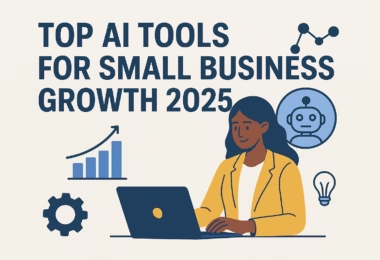Did you know that AI-generated overviews are reshaping how users interact with search engines? Google has been steadily integrating AI-driven content into search results, aiming to provide faster, more precise answers to user queries. As AI continues to evolve, its role in Google Search is becoming more prominent, impacting businesses, SEO professionals, and content creators alike.
In this blog, we’ll explore Google’s latest AI-driven search updates, their implications for SEO, and how businesses can adapt to these changes. Whether you’re a website owner or an SEO enthusiast, understanding this shift is crucial for staying ahead in the digital landscape.
What Are AI-Generated Overviews?
Understanding Google’s AI-Generated overviews in Search
Google’s AI-generated overviews provide users with summarized answers at the top of search results. This feature, powered by machine learning and natural language processing, extracts information from reliable sources and presents it in a concise, easy-to-digest format.
Key Features of AI Overviews
- Instant Summaries – Users receive direct answers without needing to click multiple links.
- Enhanced User Experience – AI filters out redundant or irrelevant information.
- Voice Search Integration – These overviews improve results for voice search queries.
- Trust & Reliability – Google sources data from authoritative websites.
How AI Overviews Impact SEO & Search Rankings
1. Decreased Click-Through Rates (CTR)
As Google provides direct answers, users may no longer feel the need to visit actual web pages. This could reduce organic traffic for informational websites.
2. Shift in Keyword Strategies
Businesses must now focus on optimizing content for AI visibility. Long-tail keywords, question-based queries, and structured data are more important than ever.
3. Importance of Authoritative Content
Google prioritizes high-quality sources. Websites with expert-backed, well-researched content will have a higher chance of being featured in AI overviews.
4. Increased Demand for AI-Friendly Content Formatting
To stay relevant, websites should:
- Use structured headings.
- Provide direct, clear answers to common queries.
- Implement schema markup for better indexing.
How Businesses Can Adapt to AI-Driven Search
1. Optimize for AI Overviews
- Use concise and informative answers at the start of articles.
- Include bullet points and lists for better readability.
- Ensure content authority by citing credible sources.
2. Leverage Schema Markup
Adding structured data helps search engines better understand your content, increasing the chances of being featured in AI-generated overviews.
3. Focus on User Intent & Engagement
Instead of chasing rankings, businesses should prioritize:
- Creating valuable, insightful content.
- Encouraging user engagement (comments, shares, discussions).
- Enhancing page experience with fast load times and mobile optimization.
4. Diversify Traffic Sources
Relying solely on Google search traffic is risky. Businesses should:
- Grow email marketing lists.
- Expand into social media marketing.
- Utilize video content for better engagement.
Future of AI in Search: What’s Next?
Google’s AI-driven evolution is just the beginning. Here are some potential future developments:
- More Personalized Search Results – AI will tailor results based on user behavior and preferences.
- Improved Multimodal Search – Google may integrate more voice, image, and video searches.
- AI-Powered Chatbots – Search results could include conversational AI responses.
- Stronger Content Moderation – AI will continue refining fact-checking and filtering out unreliable sources.
Conclusion
AI-generated overviews are changing the SEO landscape. While they enhance user experience, they also present challenges for website owners aiming to maintain traffic. The key to success lies in adapting strategies—focusing on high-quality, AI-friendly content, optimizing for structured data, and diversifying digital marketing efforts.
As Google leans further into AI-driven search, businesses must stay informed and proactive. Are you ready to optimize your content for this new era of search?
Frequently Asked Questions (FAQs)
1. What are AI-generated overviews in Google Search?
AI-generated overviews are concise summaries of search queries, generated by Google’s AI, which extract information from reliable sources to provide direct answers at the top of search results.
2. How do AI overviews impact website traffic?
Since users get direct answers from Google, click-through rates (CTR) for informational websites may decrease. However, businesses can adapt by optimizing content for AI-driven searches.
3. Can my website appear in Google’s AI-generated overviews?
Yes. To increase the chances, create high-quality, authoritative content, structure your information properly, and use schema markup to enhance search engine understanding.
4. How should businesses adjust their SEO strategies for AI search?
Businesses should focus on:
- Optimizing for AI-friendly content formats.
- Using long-tail and question-based keywords.
- Implementing structured data.
- Diversifying traffic sources beyond Google Search.
5. Will AI-generated overviews replace traditional search results?
Not entirely. While AI overviews are becoming more common, traditional search listings will still exist, especially for in-depth research and transactional queries.
6. How can I ensure my content remains relevant in AI-driven search?
Stay updated with Google’s algorithm changes, focus on high-quality and authoritative content, engage users through different platforms, and continue optimizing for SEO best practices.








Leave a Comment